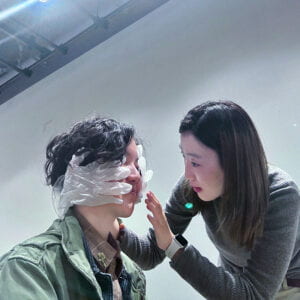In the documentary Paris is Burning, the drag performance perfectly implies Judith Butler’s idea that “the drag fully subverts the distinction between inner and outer psychic space”. Butler is essentially saying that the inner truth of gender is a fabrication, fabricated by the historical and cultural context. The compulsory heterosexual structure has made us believe that there is a coherence between our biological sexuality and gender, and the practice of fashion has been helping reinforcing the idea by defining what should be worn by men and women. While if we just see clothes as an act of adding femininity or masculinity or both to bodies, the belief that there is an inner thought that regulates what gender we identify with at the beginning of our life just doesn’t make any sense anymore. Just like Oakley notes, ‘to be a man or a woman, a boy or a girl, is as much a function of dress, gesture, occupation, social network and personality, as it is of possessing a particular set of genitals’ (1976: 158). I belief that fashion, as a reinforcement of gender norms, can also be used as weapons to fight against the compulsory heterosexuality if the body can break free and no longer be either sexed or gendered in practice.
In The Fashioned Body, it also claims that fashion is a compromise between the social world and individual desires. The ball room in the documentary provides the Latin American LGBTQ community a place where they see themselves belong to so that they are able to satisfy their individual desire for their own gender identity to the fullest extent possible through dressing and getting fully engaged in the ball culture. I mentioned in class that Paris is as this metaphor that represents any fashion associated with the high-end, the bond with society, and the majority, while the concept is getting burned in the ball room. In the documentary, we can see that fashion can also be largely personalized in a place where a sense of belonging is assured in advance by people in the community.
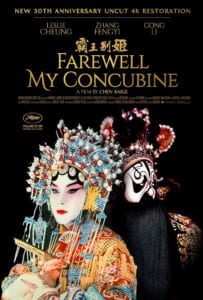
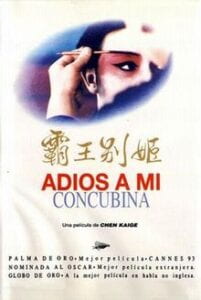
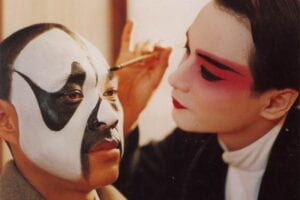
This film Farewell my Concubine 霸王别姬 captures the essence of Peking Opera during the late Qing Dynasty and the Republic of China. Within the traditional Chinese Peking Opera, there existed numerous cross-dressing roles, and Cheng Dieyi, the protagonist of this story, embodies one such character. Originally a male, Cheng Dieyi takes on the role of Yu Ji, a female character, in the opera “Farewell My Concubine.” Despite training in opera since childhood, he consistently misinterprets a crucial line in the performance, asserting, “I was by nature a boy, not a girl,” instead of the accurate, “I was by nature a girl, not a boy.” His master’s severe beatings persist until he finally sings the correct lyrics, at which point his own sense of identity undergoes a profound shift. Believing himself to be Yu Ji, he falls in love with his co-star, Duan Xiaolou, who portrays the overlord in the drama.
Cheng Dieyi finds himself torn between societal criticism and the betrayal of lover. In the movie’s conclusion, he reverts to singing the incorrect lyrics, reminiscent of his younger self. This may signify a return to a state of uncertainty, questioning whether his actions were a performance or a genuine expression of his identity. Ultimately, as a queer, Cheng Dieyi cannot attain the love of Xiaolou, and all the honor and love associated with the past and the role of Yu Ji belong solely to the character he portrayed on stage. In the end, he is left with nothing.
Inspired by the movie, Luna and I made two masks to explore the tragedy through different lenses and interpretations.
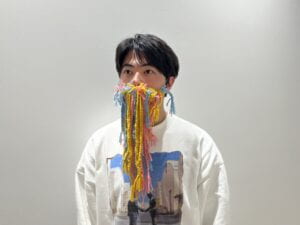
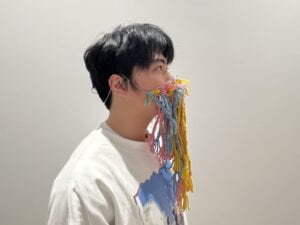
1st mask
This mask is made up of colorful threads weaved into braids, while the braids are positioned where beards grow. Braids and beards are both human hairs, but their positions in different gendered bodies have attached many more cultural and gender meanings to them. People use them to distinguish, label, and judge. As Judith Butler points out, the inner truth of gender is a fabrication and gender is a stylized repetition of acts. Through the making of this mask, we’d like to challenge and subvert the conventional view on the gendered functions of human hair, meanwhile indicating that the tragedy of Cheng Dieyi was caused largely because he was living in a time where only when he was dressed up like a woman in the opera could he become Yuji, the role he played, and have the love from his loved one, and once he removed his makeup and took off the “mask” he was wearing, he was back in reality, a place where braids and beards had their fixed positions and meanings.
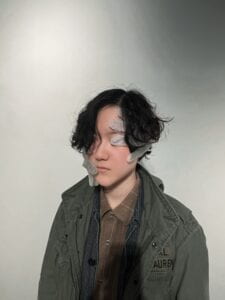
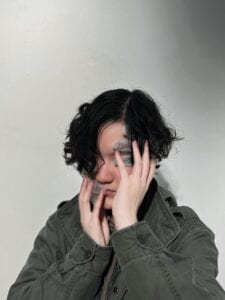
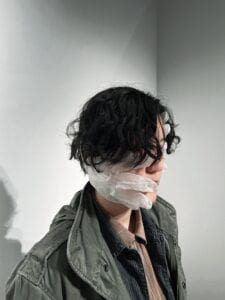
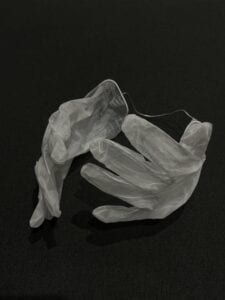
2st mask
We are people who have been pinched by the invisible but powerful hands of countless nameless people. What are we? Is it what other people want me to be? Is it the way I want to look? Those looks, are they really me?
Meanwhile, the mask wraps me so snugly that I am comfortably shaped by it and forget what I envisioned myself to be.
“I need not wait for a clear night
nor crane my neck
to examine the sky.
I have the sky at my back, at hand, and on my eyelids.
The sky wraps me snugly
and lifts me from below
…
I am a trap inside a trap
an inhabited inhabitant
an embraced embrace
a question in answer to a question.”
——The Sky – Wislawa Szymborska
In 2022, we have cooperated to make a video project (Communications Lab: Visual Metaphor) using sky as a metaphor to discuss personal emotional transitions in the pandemic. Two years have passed now. The movie Farewell My Concubine released 30 years ago (1992) seems to imply that we are constantly linked in a mutual act of conformity to social conventions and compromises have to be made. We are wearing the mask all the time.
